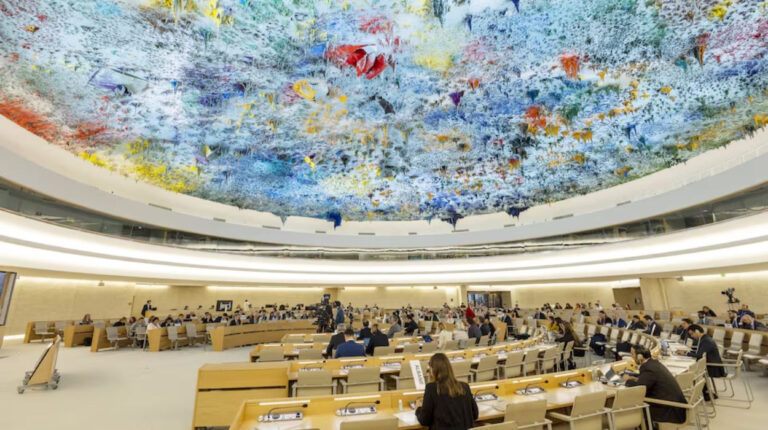China and Russia have spearheaded repeated attempts over the past five years to defund the UN’s human rights work, aiming to weaken the Office of the High Commissioner for Human Rights (OHCHR) and related investigations into grave rights violations by regimes worldwide. This covert campaign has unfolded mainly in closed-door UN budgetary discussions and programmatic reviews, intensifying amid a broader UN financial crisis marked by significant arrears from major contributors, including the United States, China, and Russia.
Strategic Funding Cuts and Political Motives
The International Service for Human Rights (ISHR) report released in October 2025 reveals that China and Russia consistently introduced proposals to slash budgets for OHCHR, particularly targeting its work on civil and political rights, investigations into abuses by Russia, Belarus, Iran, and North Korea, and protecting non-discrimination mandates. These states have framed their campaign as a push for “efficiency” and re-prioritization of UN development goals among developing countries, especially within China-led blocs like the Group of 77 (G77).
While China has increased its UN regular budget contribution from 15% to 20% as of 2025 (making it the second-largest contributor after the US capped at 22%), it leverages its considerable financial influence to advance an agenda limiting human rights oversight. China’s seat on the UN Board of Auditors and its extensive internal monitoring of OHCHR staff and operations illustrate its hands-on approach in shaping UN funding landscapes.
Russia has acted as a vocal spoiler, using its presence in the UN General Assembly Fifth Committee (5C) — which governs budget matters — to back funding cuts and block resolutions that might hinder its interests or those of allied authoritarian regimes.
Stakeholders’ Perspectives on the Defunding Campaign
Angeli Datt, an ISHR expert, explained,
“The initiatives presented by China and Russia are evidently intended to undermine the Office of the High Commissioner for Human Rights (OHCHR).”
This coordinated effort reflects a wider trend towards prioritizing state sovereignty and non-interference at the cost of global human rights accountability.
Human Rights Watch condemns these moves, stating that Russia and China’s efforts seek to stifle investigations vital to exposing abuses in authoritarian states. They warn this undermines the international accountability system and leaves victims without recourse or protection.
Additionally, some states such as Israel have intermittently attempted to leverage 5C budget discussions to curtail funding for specific human rights inquiries, though these efforts have largely failed so far due to international pushback.
UN OHCHR spokeswoman Liz Throssell highlighted the practical repercussions of these financial constraints:
“This is about victims who are less protected, people who can’t get accountability. We have now reached the critical threshold of efficiency of the system. If it goes down further, it becomes very, very, very concerning.”
The Human Rights Pillar’s Marginal Budget and Broader UN Financial Crisis
The human rights segment of the UN receives less than 1% of the total UN budget, reflecting chronic underfunding relative to its large mandate. The financing crisis has worsened since 2024 due to late or unpaid contributions. The US alone owes approximately $1.5 billion, China $192 million, and Russia $72 million.
China’s extreme delay in paying its 2024 dues until late December rendered much of those funds unusable per UN financial regulations that require unused funds be returned, intensifying liquidity constraints. These arrears exacerbate the struggle faced by OHCHR and other agencies dependent on assessed contributions.
Secretary-General Antonio Guterres’ UN80 reform initiative is attempting to achieve budget rationalization across UN’s three pillars — peace and security, human rights, and sustainable development — but ISHR warns that human rights budgets are at risk of disproportionate cuts given their historically smaller allocations.
Geopolitical Implications and Challenges Ahead
China and Russia’s campaign reflects an ongoing global power struggle influencing the multilateral human rights architecture. By framing the debate around sovereignty and development priorities, these states constrain the UN’s ability to address rights abuses robustly.
This political dynamic threatens to weaken independence and effectiveness of human rights bodies just as global crises and authoritarian abuses have increased. Maintaining a strong, adequately funded OHCHR is crucial for accountability, protection of vulnerable populations, and support for civil society worldwide.
The situation demands concerted diplomatic action by states committed to international human rights norms to safeguard the UN’s human rights mechanisms and reject attempts to weaponize budget procedures against them.
Images are for reference only.Images and contents gathered automatic from google or 3rd party sources.All rights on the images and contents are with their legal original owners.
